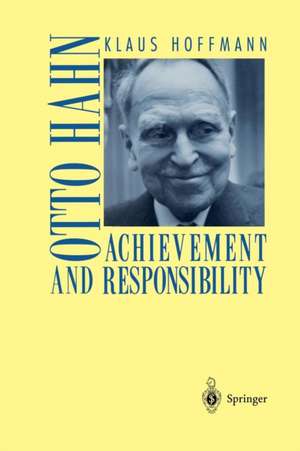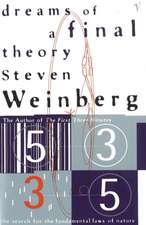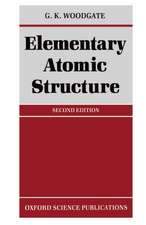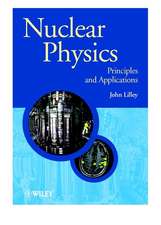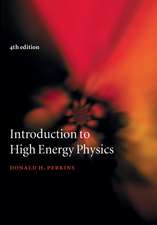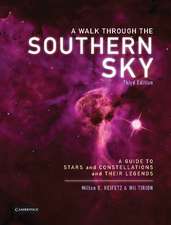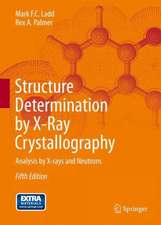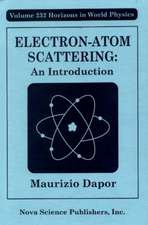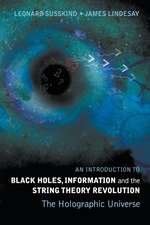Otto Hahn: Achievement and Responsibility
Autor Klaus Hoffmann Traducere de J.M. Coleen Limba Engleză Paperback – 21 sep 2012
Reviled by many after the war as one of the people responsible for the carnage at Hiroshima and Nagasaki, Hahn had already begun to reflect on the social responsibility of scientists for their fundamental discoveries and the subsequent applications of the knowledge they create. Already during the war, Hahn had protested Nazi restrictions on Universities and researchers, and after the War, he became actively involved in efforts to restrict the spread of nuclear weapons.
In this volume Klaus Hoffmann discusses Hahn's contributions to science and his reflections of scientific and social responsibility. He concludes that Hahn's ideas can still serve as a foundation for responsible and moral actions by scientists.
| Toate formatele și edițiile | Preț | Express |
|---|---|---|
| Paperback (1) | 252.91 lei 3-5 săpt. | |
| Springer – 21 sep 2012 | 252.91 lei 3-5 săpt. | |
| Hardback (1) | 310.12 lei 3-5 săpt. | |
| Springer – 25 mai 2001 | 310.12 lei 3-5 săpt. |
Preț: 252.91 lei
Nou
Puncte Express: 379
Preț estimativ în valută:
48.39€ • 50.66$ • 40.28£
48.39€ • 50.66$ • 40.28£
Carte disponibilă
Livrare economică 10-24 martie
Preluare comenzi: 021 569.72.76
Specificații
ISBN-13: 9781461265139
ISBN-10: 1461265134
Pagini: 292
Ilustrații: X, 276 p.
Dimensiuni: 155 x 235 x 15 mm
Greutate: 0.41 kg
Ediția:Softcover reprint of the original 1st ed. 2001
Editura: Springer
Colecția Springer
Locul publicării:New York, NY, United States
ISBN-10: 1461265134
Pagini: 292
Ilustrații: X, 276 p.
Dimensiuni: 155 x 235 x 15 mm
Greutate: 0.41 kg
Ediția:Softcover reprint of the original 1st ed. 2001
Editura: Springer
Colecția Springer
Locul publicării:New York, NY, United States
Public țintă
Popular/generalCuprins
1 Atom Bomb and Nobel Prize.- 1.1 Hidden Microphones.- 1.2 Death Clouds over Hiroshima.- 1.3 Hot Tempered Discussions.- 1.4 Rumours about Professor Hahn.- 1.5 Criminal Investigation for a Nobel Prize Winner.- 2 Boyhood, Studies, and the First Probationary Years.- 2.1 The ‘Good Year’ 1879.- 2.2 University Studies in Marburg and Munich.- 2.3 Soap Bubbles and Exploding Chlorine Gas: Dr. Hahn as an Assistant Lecturer.- 2.4 “You Will Work on Radioactivity”.- 3 The Awakening of the Natural Sciences.- 3.1 Puzzling Radiation.- 3.2 Pioneering Ideas.- 3.3 ‘Atomic Energy’.- 3.4 Radium-The Great Revolutionary.- 4 The First Scientific Discovery.- 4.1 In London with William Ramsay.- 4.2 Radiothorium-The First New Element.- 4.3 An Uncertain Future.- 4.4 The Finest Year of His Life: In Montreal with Rutherford.- 5 Research at the University of Berlin.- 5.1 The Joy of a Discoverer in a Workshop.- 5.2 It’s Unbelievable What Qualifies as a University Lecturer Nowadays.- 5.3 An Element Is Not an Element.- 5.4 Lise Meitner.- 5.5 Isotopy-The Puzzle’s Solution.- 5.6 International Meetings.- 5.7 The Nucleus of the Atom.- 5.8 An Absent Minded Professor.- 6 The Kaiser Wilhelm Society.- 6.1 A ‘Call to the Nation’.- 6.2 The Kaiser Comes!.- 6.3 Radiation Protection—At That Time a Foreign Word.- 6.4 Research Work at the Kaiser Wilhelm Institute.- 7 The First World War.- 7.1 The Defence Forces and Science.- 7.2 Poison Gas Warfare.- 7.3 A Scientist at the Cross Roads.- 7.4 If Only Atoms Would Fly Into Pieces.- 8 New Success for the Atomic Researchers.- 8.1 The Old Dream of th e Alchemists.- 8.2 The Father of the Race , Protoactinium.- 8.3 No Luck Without Service.- 8.4 Applied Radiochemistry.- 8.5 The Remarkable Year 1932.- 9 National Socialism-Night Falls on German Science.- 9.1As Visiting Professor in America.- 9.2 Hahn Practises Solidarity.- 9.3 Commemoration for Fritz Haber.- 9.4 Germ an Physics-Excels in the World.- 10 Dispute Over the 93rd Element.- 10.1 Experiment in a Goldfish Pond.- 10.2 In Honour of Mendeleev.- 10.3 An Absurd Theory.- 10.4 Elements 93,94,95,96 . . . ad Infinitum?.- 10.5 Lise Meitner in Exile.- 11 The Splitting of the Uranium Atom.- 11.1 The Error Was Tackled with Heaven’s Fire.- 11.2 A St aggering Discovery.- 11.3 200 Million Electron Volts.- 11.4 “Real American Exaggeration”.- 11.5 Indispensable Chain Reaction.- 11.6 60th Birthday Celebratory Volume.- 11.7 The False Thans-uranics.- 11.8 Fantastic Energy.- 12 The Threat of Hitler’s Atom Bomb.- 12.1 A Memorable Conversation.- 12.2 Orders to Report for the Atomic Researchers.- 12.3 Heavy Water.- 12.4 An Outsider.- 12.5 The Bomb Will Not Explode.- 12.6 Nuclear Physics as a Weapon.- 13 The American Super-Explosive U235.- 13.1 Press Censorship.- 13.2 An Historic Letter.- 13.3 The Devil’s Business is Done.- 13.4 The Worries of General Groves.- 13.5 Otto Hahn’s Activities During the War.- 13.6 The Last German War Secret.- 14 The Hunt for the Atomic Scientists.- 14.1 The Alsos Mission Is on Target.- 14.2 ‘No Fraternisation!’.- 14.3 ‘The Day of the Uranium Bomb’ , 6 August 1945.- 14.4 A Difficult Decision.- 15 A World Full of Prejudice.- 15.1 A Protest in Despair.- 15.2 Uranium Is Like a Curse.- 15.3 Nobel Prize Winner for Chemistry.- 15.4 President of the Max Planck Gesellschaft.- 16 Atom Bomb Diplomacy.- 16.1 A Piece of Good News.- 16.2 Big Stick Politics.- 16.3 No More Hiroshimas.- 17 In Conflict with Conscience and Politics.- 17.1 Atomic Energy Literature Instead of Crime Novels.- 17.2 Cobalt 60.- 17.3 Declaration on Mainau Island.- 17.4 InternationalAtomic Energy Conference.- 18 The Call of the Göttingen Eighteen.- 18.1 Reduced to Silence, Yet not Convinced.- 18.2 A NATO Officer Blabs out of School.- 18.3 The Gottingen Statement.- 18.4 ‘Unsuspecting Fools‘.- 18.5 Ten Against Five.- 18.6 An Incorrect Communique.- 19 Against Nuclear Weapon Experiments and Nuclear Balance.- 19.1 Political Creeds.- 19.2 Honours and Prizes.- 19.3 A Departing President.- 19.4 Last Journeys.- 19.5 Atom Bombs Stop.- 19.6 The Sun on t he Earth: The Resp onsibility of Science.- 20 Timetable.- 21 Sources and Pointers.- Translator’s Notes on the Text.
Recenzii
From the reviews of the first edition:
"J. Michael Cole translated this biography, which appeared in German on the occasion of the 25th anniversary of the death of Otto Hahn. … the description of the life and thinking of this great scientist is fascinating and thrills everyone who takes an interest to read it. … the chronological course of events in his life, career, and his thinking is presented in such a gripping style, that it is hard to put the book down." (K.-E. Hellwig, Zentralblatt MATH, Vol. 1069, 2005)
"J. Michael Cole translated this biography, which appeared in German on the occasion of the 25th anniversary of the death of Otto Hahn. … the description of the life and thinking of this great scientist is fascinating and thrills everyone who takes an interest to read it. … the chronological course of events in his life, career, and his thinking is presented in such a gripping style, that it is hard to put the book down." (K.-E. Hellwig, Zentralblatt MATH, Vol. 1069, 2005)
